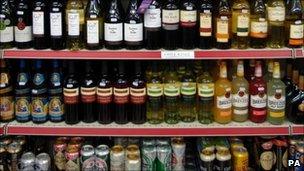Scots 'drink a quarter more alcohol' than other Brits
- Published

More than three-quarters of all alcohol sold in Scotland costs less than 50p a unit
Scottish adults buy a quarter more alcohol than the rest of Britain, according to an NHS study.
The extra intake equated to about two more pints of beer or two glasses of wine a week, compared to other Britons.
A second NHS report examining off-trade sales and the link between price and over-consumption, found 77% of drink was sold at less than 50p a unit.
The Scottish government is proposing a minimum price per unit in legislation being considered by the parliament.
The NHS Health Scotland report examined alcohol sales between 2005 and 2009.
It found that Scots have a preference for drinking at home - with one factor being that alcohol sold in off-licences and supermarkets is three times cheaper per unit than that sold in pubs.
Alcohol sales in the off-trade were double those of licensed premises, accounting for 68% of all Scottish drink sales and retailing at around 43p per unit.
Drink sold in pubs and restaurants was charged at £1.31 per unit and accounted for 32% of all alcohol sales north of the border.
NHS Health Scotland's director of public health science, Dr Laurence Gruer, said raising the price of alcohol in shops and supermarkets would help address the problem of over-consumption.
The second NHS report looked at off-trade sales and the correlation between price and over-consumption.
It revealed that a man only had to spend £4.40 on cider to exceed the government's recommended weekly limit of 21 units. A woman had to spend just £3 to exceed their recommended 14 units.
Researchers found that 77% of all drink was sold at less than 50p a unit, 51% at 40p or less and 16% at 30p or less.
'Harmful amounts'
There were also variations in the price per unit according to the type of beverage, with 59% of vodka selling at less than 35p per unit, and 26% of cider for less than 20p per unit.
Dr Gruer said: "We know there are strong links between lower price and increased consumption - and between increased consumption and more alcohol-related problems of all sorts.
"In recent years, alcohol from off-sales has become relatively cheaper, encouraging many more people to drink harmful amounts."
He said the findings underlined the need for action on cheap off-sales alcohol in Scotland.
"It's by no means the only action needed, but the research shows clearly that nothing else is as effective as raising the price of alcohol," he added.
The Scottish government has not yet detailed the price per unit it would introduce under its plans, which are supported by the BMA in Scotland.
However, the measure has been rejected by Labour and Conservative MSPs.
'Not the answer'
Richard Simpson, Scottish Labour's public health spokesman, said: "We support the end of heavy discounting and irresponsible sales of alcohol as loss leaders, but minimum unit pricing is not the answer.
"It would put more than £113m into the pockets of big retailers instead tackling the causes and effects of alcohol misuse."
He said all parties had to work together to find "credible alternatives".
The Scottish Conservative public health spokeswoman, Nanette Milne, said: "These reports confirm what we already know - Scotland has a drink problem and urgent, effective action is required to tackle it.
"But indiscriminate blanket minimum pricing has no evidence base, would penalise responsible drinkers, harm the Scotch whisky industry, cost jobs and is probably illegal."
She said her party believed the tax and duty system had a major part to play in increasing the price of "problem drinks".
The Scottish Liberal Democrat health spokesman, Ross Finnie, said: "We are clear that selling alcohol at below cost prices must end."
- Published27 June 2010